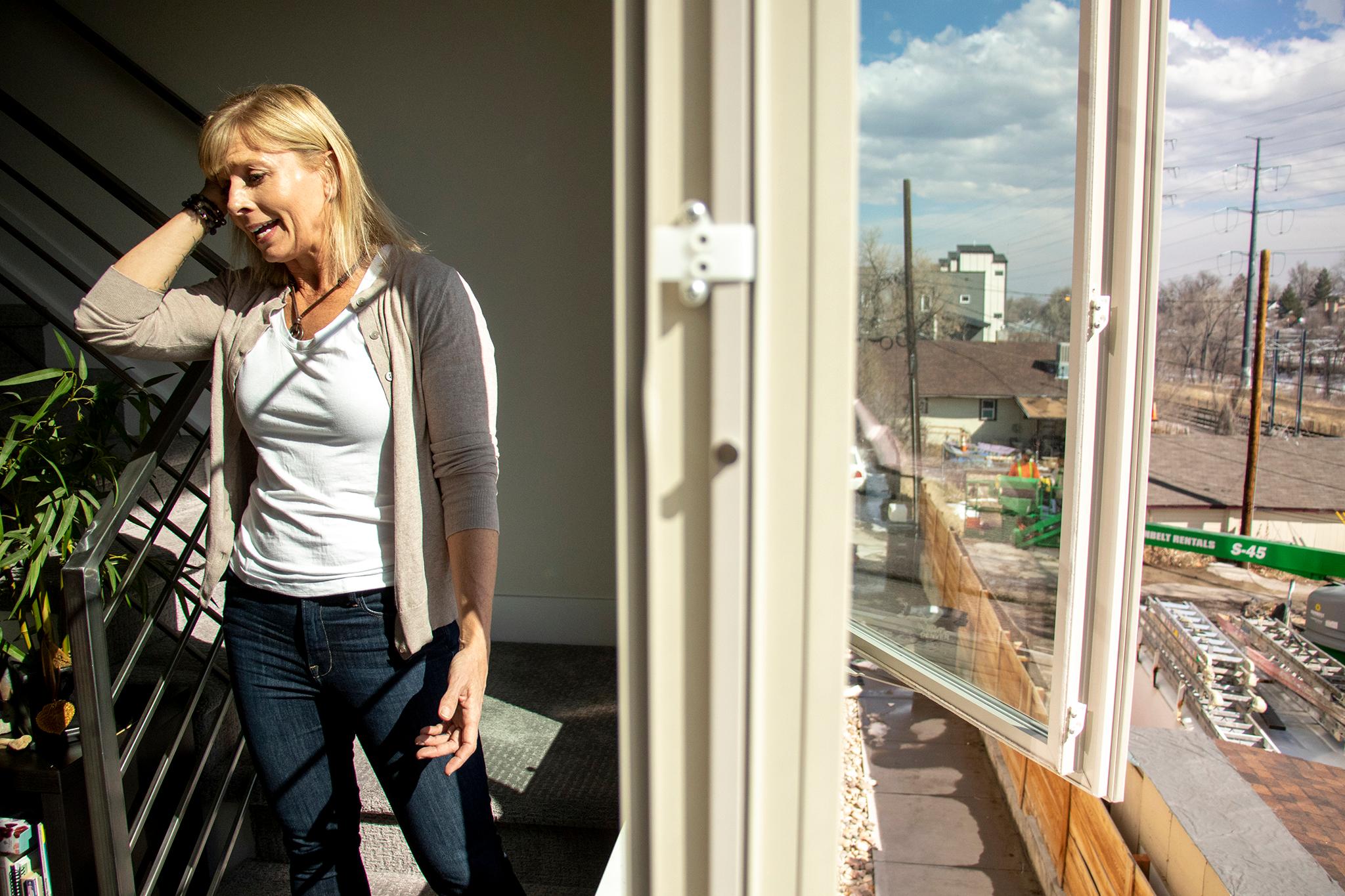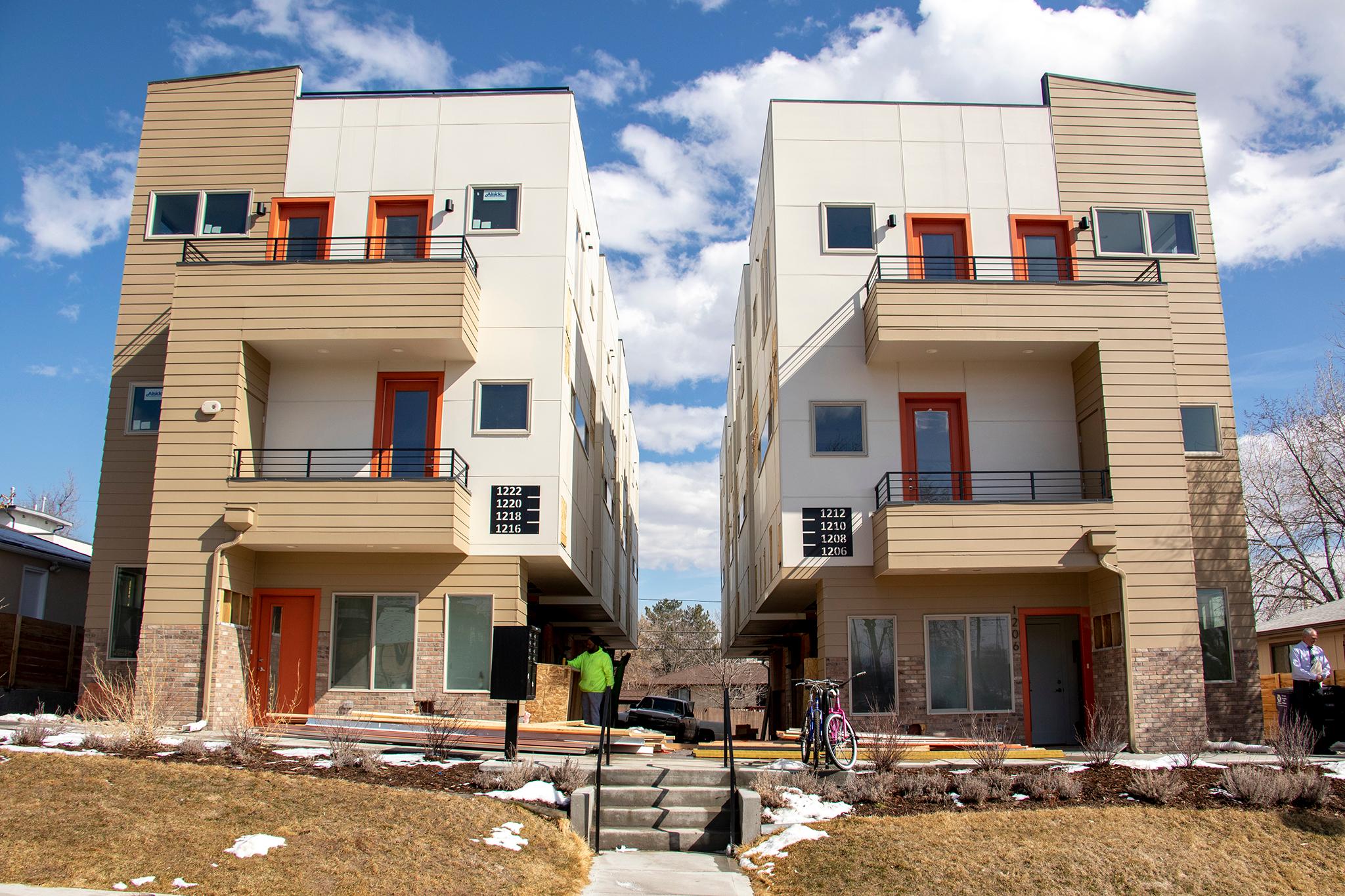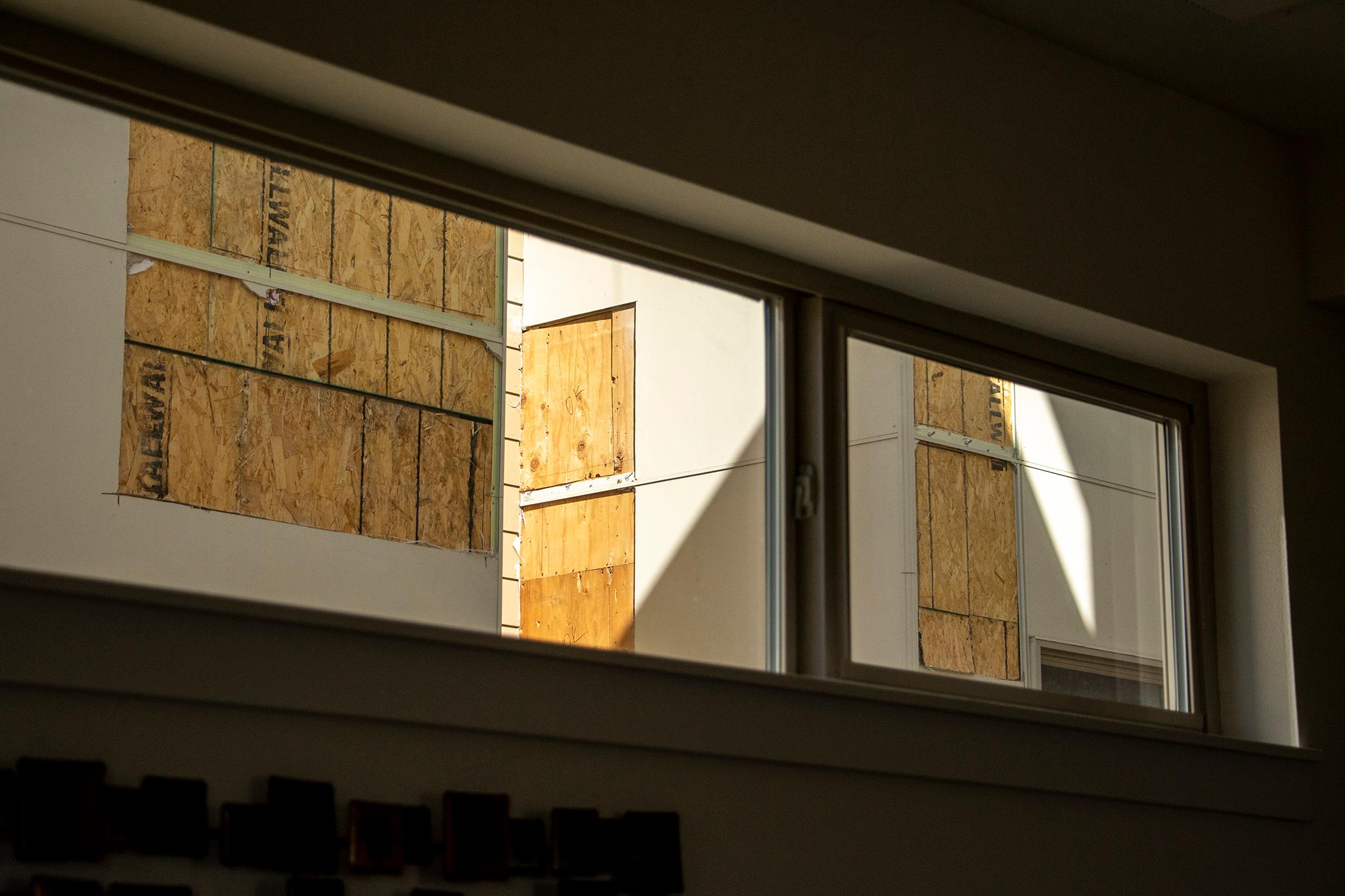UPDATE: The lawsuit was settled in mid-August.
After the city raised safety concerns so serious that new beams had to be installed to support a row of homes in West Colfax, the owners and their builder joined to sue the engineering company. The engineers in turn blamed the city and a company contracted to review building plans.
The legal tangle spelled out in Denver District Court papers is a matter of life or death for the small building firm and, at the very least, stress for the homeowners and the engineers. It also puts a spotlight on how Community Planning and Development is managing, amid Denver's building frenzy, to ensure that developers can meet the demand for housing -- and do it safely.
The pressure is strong to get permits issued so people can have houses and offices. In a 2017 report, the Denver auditor focused on the building permitting system, noting "Denver is growing quickly, and we want to ensure the process for planning projects is effectively meeting city objectives and efficient for customers." The auditor's recommendations on improving efficiency urged reviews to determine whether staffing and resources were sufficient. Safety was not a focus of the report, the most recent to look at permitting.
Rhonda Kelly's new home was too good to be true.
Kelly, a former firefighter and paramedic who now works to support the mental health of first responders, just wanted to own her own home. Kelly had been renting downtown and hoped to buy in that part of Denver, but had no luck finding the right place. She'd put offers in on a few homes, but was outbid. Then she found an eight-unit project in West Colfax developed by a Denver company called Sustainable Design Build. She learned a deal on one of the homes had just fallen through and the builders seemed eager to move forward with her.
"I was super-stressed at work," Kelly remembered. "I thought this was the one thing that was falling into place."
It's a typical slot home, built to maximize land use with two floors of living space stacked above the garage. A rooftop deck gives a sense of spaciousness, offering views of downtown and the mountains. Kelly, who paid $470,000, could watch the W light rail train approach and run out to catch a ride to Union Station from RTD's Perry Station a block away.
Kelly said the builders suggested she not bother hiring her own inspector. Jonathan Pray, a lawyer representing the builders, said his clients had no recollection of making such a suggestion.
Kelly acknowledged the decision not to hire an inspector was her own.
"I shouldn't have [skipped it]," she said. "I was just moving so fast."

Kelly eventually brought in not just an inspector but a lawyer. That was after she bought her home and moved in in February of 2018. Problems became clear quickly, she said. After it rained or snowed, water would build up under the rooftop decking and a balcony decking because of drainage problems. Weather stripping and screens were missing. Water is leaking from the shower in her master bathroom. Several windows also leak. Door jambs are discolored by water damage. Kelly worries about mold.
"The windows don't seal," she said. A bedroom window "shifts and sags and cracks so much it wakes me up at night when it's windy."
She recalled the day an inspector she had hired was in the house while the builder was there to discuss the shower leak. The inspector's gas detector sounded a warning. It was determined her stove had been poorly installed, leading to a gas leak. An orange warning sticker Excel placed on the appliance jarred with the muted grays of Kelly's walls and furniture.
Then, last April, Kelly and owners of the six neighboring units that had been sold at that point received notices from the city of possible structural problems.
Scott Prisco, an architect and Denver Community Planning and Development's chief building official, said in an interview that inconsistencies had been found in the calculations of a structural engineer who had worked on a number of projects in town. Prisco characterized the problem as miscalculations of load capacity.
"A major wind event would be a problem," Prisco said.
Emails show understaffing in the city and a struggle to get structural reviews completed on time.
Reviewers who were spot checking structural calculations in building plans had noticed an issue, prompting a deeper exploration of the work of the engineering firm that Kelly's developer, Sustainable Design Build, had contracted.
Sustainable Design Build was directed to replace beams on eight townhomes that included Kelly's and five at another site.
"The developer right from the beginning said they wanted to make it right," Prisco said. "They feel they have a reputation. They want to do the right thing."
"They appreciated that we as a city and county wanted the building to be safe," he said.
That's how he describes his department's wider responsibility.
"We want to make sure the buildings are safe, that they meet code and they're built well," he said.
Prisco, noting he came from the private sector himself, said he wants to work with contractors -- who are, after all, necessary to getting buildings built in a fast-growing city. Prisco can suspend or revoke contractors who are consistently "bad actors." While he said in an interview that he has done so only once in his three years in his position, Community Planning and Development spokeswoman Laura Swartz corrected that in an email Monday, saying that since July 2016, 19 contractor's licenses had been suspended or revoked.
"We don't want to shut people down," Prisco said.
He acknowledged it was unusual to go back after the city has granted a certificate of occupancy that allowed Kelly and her neighbors to move in. But he described the episode as an example of the city taking proper action to safeguard the public.
In an email, Community Planning and Development spokeswoman Swartz said the initial structural review of the plans for Kelly's home was conducted by SAFEbuilt, a private contractor hired by the city.
"SAFEbuilt has been unable to fulfill their obligation to review a certain number of projects for us, specifically structural reviews," a Community Planning and Development supervisor wrote in a July 2018 email directing staff members to do the work instead.
That and other emails were obtained by Denverite through a public records request.
C. Michael Bradbury, an engineer, worked for Denver's building department in 2018 and was among the reviewers who got the July email about picking up work SAFEbuilt had failed to perform. Bradbury said he was let go after four months because the care he took on plan reviews took what his supervisors saw as too much time. The city does not comment on personnel matters.
"The city, in my opinion, is building too fast," Bradbury said. "They're building to the point where stuff's being missed. It could hurt people. You can build it fast, but it's got to comply with code."
Bradbury acknowledged people might dismiss him as disgruntled -- and that he is, to some extent.
But "I'm also speaking because of public safety," he said.
Denver officials have "either got to hire more reviewers or put the brakes on," Bradbury said.
One in a chain of emails Denverite received in response to its freedom of information request included a plea from a businesswoman whose downtown office was being remodeled. She wrote for help last July about a structural review on which nothing had been heard since May.
"Our contractor has been in touch with CPD (Community Planning and Development) several times and was informed on June 29: 'Currently, we have a significant backlog based on personnel vacancies and difficulty hiring structural engineers,'" the woman wrote.
Jill Jennings Golich, interim executive director of Community Planning and Development, forwarded the email to Barry Kramer, a SAFEbuilt plan review manager. She added that the work "needs to get done and so you need to figure this out."
In another email last July, Jennings Golich wrote to Kramer and one of his colleagues, Travis Reynolds, pointing out a "need to see progress on the jobs previously assigned to you. We currently have 24 late structural reviews, of those 15 are assigned to you."
"A number of these were due in May -- it is now July 2. These need to get reviewed," Jennings Golich said.
Almost exactly a year earlier, Jennings Golich had signed off on a request to City Council to amend Denver's contract with SAFEbuilt from $2 million to $5 million. She cited a hail storm that May that had led to a large increase in roofing permits and said her department was "seeing continued increase in building permit requests for commercial/multifamily and single-family/duplex projects, beyond what staff are able to process." City Council approved her request.
Jennings Golich said in the request that her department had begun talking about looking for outside help in 2014, following three years in which staffers who reviewed residential plans had seen a steady increase in work and a decrease in initial reviews being completed on time. More staff was added in 2014, but while the newcomers were being trained "volumes continued to increase 77 percent from 2011 to 2014."
SAFEbuilt, which is headquartered in Loveland and works with municipalities across the country, won its first contract with Denver in 2015, beating out four other firms in a bidding process.
In June of 2016, Community Planning and Development went to City Council to ask for -- and get -- an extra $1.3 million, describing its struggles to keep pace with a building permit volume described at the time as up 10 percent over the previous year. Part of the money went to a contract for plan review and inspections with SAFEbuilt.
In a note accompanying the release of the emails, Community Planning and Development spokeswoman Swartz said that "while we work closely with SAFEbuilt, we don't have formal performance reviews for them; however, each of the attached emails speaks to how seriously we take the quality and timeliness of the work SAFEbuilt performs and the way they communicate with customers, just as we do for our in-house plan review staff."
Swartz added on the case that has gone to court:
"One thing to be clear on is that Ms. Kelly's home has always been safe to occupy. We intervened to ensure the work fully meets code," Swartz said. "We are here to make sure all of Denver's buildings meet international standards of safety and quality, and we will continue being vigilant to do just that."

Now, everyone is in a legal tangle...
In its breach of contract lawsuit against DL Engineering involving Kelly's and the other homes, Sustainable Design Build said that "the structural engineering for the projects was so deficient that emergency shoring methods had to be taken to prevent potential collapse of the projects."
"Following completion of the project it became apparent that certain as-built conditions did not comply with applicable structural building code requirements or the applicable professional standard of care ...," the developers added in court documents.
The suit filed last November was amended in March to bring in as plaintiffs the homeowners, including Kelly who united with the builders despite earlier tensions over less serious issues.
A call to DL Engineering seeking comment was not returned. But in a response filed with the court in March, DL Engineering said the city's building department and SAFEbuilt had misinterpreted the building code. The engineering company did not elaborate on that point, but went on to say that "to the extent that the claims and allegations asserted by plaintiffs are true, then the building department breached its duty, and the damages suffered by the plaintiffs were caused in whole or in part by the negligence" of the city, which was not named in Sustainable Design Build's suit.
The city's building department and SAFEbuilt "owed plaintiffs a duty to perform this work with reasonable care and without negligence so as to avoid causing plaintiffs damages," DL Engineering told the court.
Denverite received no response to phone calls and emails to SAFEbuilt executives, including plan review manager Kramer and his colleague Reynolds, seeking comment.
Sustainable Design Build is partners Mike McCarty and Zach McKendry. When they were informed about the structural issue, they said their first move was to fix their buildings. Doing so has cost at least $1.5 million. They have maxed out their credit cards, borrowed from relatives and had to let staff go. Their professional reputation has suffered.
"The company is threatened," McCarty said. "Everything that we have is on the line to fix the structural issue that was not created by us."
"Developers get a bad name, a bad rap," McCarty said. But "this wasn't 'the builder messed up.'"
McKendry said: "We're having to fight in the legal system to recoup these expenses."
While they have questions about the review process conducted by SAFEbuilt and the city, they believe DL Engineering failed to create documents that stood up to review.
"The city has taken a very hard-nosed stance that it's not their fault," McCarty said. "All we can control is going after the structural engineer that started the problem in the first place."
His partner added: "We have sympathy for all the homeowners that have been wrapped up in this deal."
"We've paid for the legal fees for them to be represented in our case with DL," McKendry added.
McCarty, whose background is in real estate, and McKendry, a construction contractor, started working together in 2015 and formed their company in 2016, committed to building homes middle-class people could afford. Their business plan included searching out sites along transit corridors.
"In Denver, where we need more housing, attainable and affordable, we're trying to build more housing," McCarty said.
Their suit was settled in August after mediation. McKendry said the settlement involved a payment from the engineer's insurance company that did not cover all his company's losses.
The takeaway, according to the pros? "Buyer beware."
Kelly and her neighbors were able to live in their homes during the structural work, though they weren't able to use their garages for months.
A private inspector might not have caught the structural problem. But if Kelly had consulted one, perhaps she would have walked away from the deal because of other issues. Kelly has been negotiating over the smaller issues with Sustainable Design Build.
Colorado's construction defect law prioritizes cooperation and mediation over litigation. Homeowners have two years from the time they observe a problem to take action. A homeowner considering a lawsuit must first give a builder a list of defects and a chance to inspect the problems. Then the builder has a month to offer, in writing, to settle, either with a payment or a plan to fix the defects. If the owner rejects the builder's offer, the next step could be mediation, and only after that a trial.
Real estate attorney Joe Stengel said the main lesson is an old one:
"Buyer beware," he said in an interview. "People are so trusting that oftentimes they get taken advantage of."
Stengel, who began representing Kelly after she encountered problems, said he was speaking generally, not about any specific person, entity or situation. He said house hunters need to move slowly.
"You can't be too careful. You're talking about a huge investment," he said. "You need to take your time.
But, he said, "you are told, 'There are 15 people who are ahead of you, you've got to make a deal.'"
It can feel like everyone is in a rush. As Stengel observed in a blog on his firm's Web site:
"A hot market brings all kinds of folks to the table. Some will be legitimate, but may cut a few corners trying to keep profits up, or may have trouble hiring and keeping competent and skilled workers on the crew. Even the most conscientious company will be under pressure to complete projects rapidly and get on to the next project."
Jill Schafer, who chairs the market trends committee of the Denver Metro Association of Realtors and is a Kentwood Cherry Creek broker, has no connection to the West Colfax case or to Stengel. She said when problems come up, established builders respond, if only to protect their reputations. But some newer builders aren't as forward-looking, or perhaps haven't been around long enough to see what kinds of problems can arise and to learn how to manage them, she said.
Like Stengel, Schafer urges buyers to be cautious. One step she strongly suggests is hiring a professional home inspector.
"I know a lot of people feel that a new property has been through city inspections and doesn't need an outside inspection. But I really recommend it," Schafer said. "It is not required by banks or anybody to have an outside inspector, but it's something people should consider."
Schafer also advises homeowners to educate themselves. They can review copies of certificates and permits builders are required to get from the city. If those records show, for example, that electrical inspectors refused multiple times before finally approving work on the house you want, you might want to have your inspector look particularly carefully at the wiring. An attorney can help go over contracts and other paperwork. Schafer said homeowners often balk at the extra expense, but that it's likely to be just a few hundred dollars and could save money down the road.














